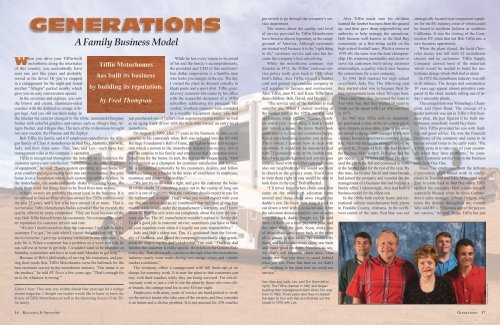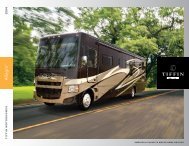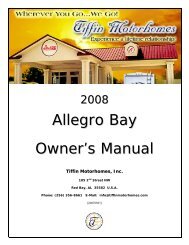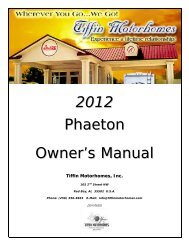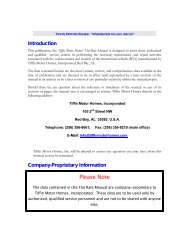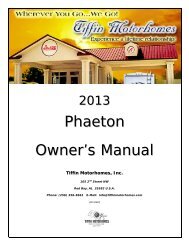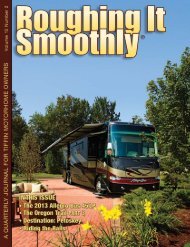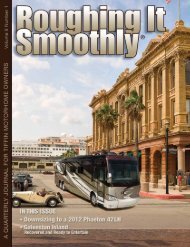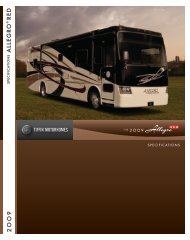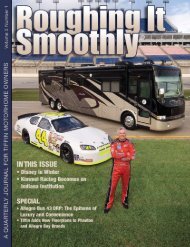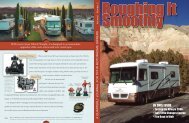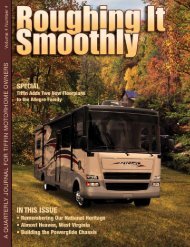Roughing It Smoothly - Tiffin Motorhomes
Roughing It Smoothly - Tiffin Motorhomes
Roughing It Smoothly - Tiffin Motorhomes
You also want an ePaper? Increase the reach of your titles
YUMPU automatically turns print PDFs into web optimized ePapers that Google loves.
hen you drive your <strong>Tiffin</strong>-built<br />
motorhome along the interstates<br />
of this country, you undoubtedly have<br />
seen one just like yours and probably<br />
waved at the driver. Or you’ve stopped<br />
in a campground for the night and found<br />
another “Allegro” parked nearby which<br />
gave you an easy conversation opener.<br />
In the seventies and eighties, you saw<br />
the brown and cream, aluminum-sided<br />
coaches with the distinctive orange Allegro<br />
logo. And you still see them today. In<br />
the nineties the exterior changed to the white, laminated-fiberglass<br />
bodies with colorful graphics and names such as Allegro Bay, Allegro<br />
Pusher, and Allegro Bus. The turn of the millennium brought<br />
two new models: the Phaeton and the Zephyr.<br />
Bob <strong>Tiffin</strong>, his family, and 615 employees manufacture the Allegro<br />
family of Class A motorhomes in Red Bay, Alabama. His wife,<br />
Judy, and their three sons—Tim, Van, and Lex—each have key<br />
management roles in the company’s operation.<br />
<strong>Tiffin</strong> is recognized throughout the industry as a champion for<br />
customer service and satisfaction. “<strong>Motorhomes</strong> are complex pieces<br />
of equipment,” he said. “Every system operating in your home for<br />
your comfort and enjoyment is built into our motorhomes. But your<br />
home is on a foundation where each system sits solidly in place. In<br />
the motorhome, the roads constantly shake everything loose. We<br />
build them solid, but things have to be fixed from time to time.”<br />
Allegro owners are probably the most loyal in the business. <strong>It</strong> is<br />
not unusual to find an RVer who has owned five <strong>Tiffin</strong> coaches over<br />
the past 25 years, and a few who have owned 10 or more. That is<br />
not because <strong>Tiffin</strong> <strong>Motorhomes</strong> builds a product that far exceeds the<br />
quality offered by every competitor. They are loyal because of the<br />
way Bob <strong>Tiffin</strong> himself treats his customers. No company has a better<br />
reputation for customer service and care.<br />
“We don’t shield ourselves from the customer. I will talk to every<br />
customer I’ve got,” he said when I visited the plant last fall. “I listen<br />
to everyone. I give my company extension to any customer who<br />
asks for it. When a customer has a problem on a week-end trip, he<br />
can call me at home to get help. I wouldn’t want to be stranded on<br />
Saturday somewhere and have to wait until Monday to get help.”<br />
Because of Bob’s philosophy of serving his customers, and putting<br />
their needs first, <strong>Tiffin</strong> <strong>Motorhomes</strong> owns the hallmark for the<br />
best customer service in the motorhome industry. “Our name is on<br />
the product,” he told RV News a few years ago. “That’s enough for<br />
us to fix whatever is wrong.”<br />
Editor’s Note: This story was written almost four years ago for a college<br />
alumni magazine. I thought our readers would like to know to know the<br />
history of <strong>Tiffin</strong> <strong>Motorhomes</strong> as well as the interesting history of the <strong>Tiffin</strong><br />
family.<br />
A Family Business Model<br />
<strong>Tiffin</strong> <strong>Motorhomes</strong><br />
has built its business<br />
by building its reputation.<br />
by Fred Thompson<br />
While he has every reason to be proud<br />
of his and the family’s accomplishments,<br />
the president and CEO of this multi-million<br />
dollar corporation is a humble man<br />
who looks you straight in the eye. The day<br />
I visited the plant he dressed casually in<br />
khaki pants and a sport shirt. <strong>Tiffin</strong> greeted<br />
every customer who came by his office<br />
with the respectful demeanor of a 1950s<br />
schoolboy addressing his principal. His<br />
cordial, Southern manners were extended<br />
to a wealthy equipment dealer who had<br />
just purchased one of <strong>Tiffin</strong>’s most expensive motorcoaches as well<br />
as an aging truck driver with his wife who owned an entry-level<br />
motorhome.<br />
On August 5, 1999, after 27 years in the business, it came as no<br />
surprise to his customers when Bob was inducted into the RV-MH<br />
Heritage Foundation’s Hall of Fame, the highest honor and recognition<br />
which a person in the motorhome industry can receive. And it<br />
was no surprise to his family and employees that a customer nominated<br />
him for the honor. In part, the text on the plaque reads, “Bob<br />
is recognized as a champion for customer satisfaction and service.<br />
He is recognized nationally by his customers, dealers, and fellow<br />
manufacturers as a leader in the areas of excellence in employee,<br />
customer, and dealer relationships.”<br />
“We just try to do what’s right, and give the customer the benefit<br />
of the doubt. If something wears out in the course of long use<br />
and it is out of warranty, then the customer should expect to pay for<br />
the replacement or repair. That’s what you would expect with your<br />
car. But one fellow had an air conditioner that had been giving him<br />
trouble while it was under the manufacturer’s warranty, and I knew<br />
about it. Then the unit went out completely about the time the warranty<br />
was up. The AC manufacturer wouldn’t replace it. So we did.<br />
To do a good job in customer service, sometimes you have to back<br />
up your suppliers even when it’s legally not your responsibility.”<br />
Judy and Bob’s oldest son, Tim, 41, graduated from the University<br />
of Alabama, and joined the company immediately after graduation.<br />
In discussing his dad’s leadership, Tim said, “The way dad<br />
handles the customer is really special. He practices the Golden Rule<br />
every day. That philosophy carried us through when the motorhome<br />
industry nearly went under during two energy crises and volatile<br />
market conditions.”<br />
The company offers a campground with full hook-ups at no<br />
charge for warranty work. <strong>It</strong> is near the plant so that customers can<br />
stay with their coaches while they are being serviced. For out-ofwarranty<br />
work or just a visit to see the plant by those who own other<br />
brands, the campground fee is only $10 per night.<br />
Employees with many years of service are hand-picked to work<br />
on the service teams who take care of the owners, and they consider<br />
it an honor and a choice position. <strong>It</strong> is not unusual for 250 coaches<br />
per month to go through the company’s service<br />
department.<br />
The stories about the quality and level<br />
of service provided by <strong>Tiffin</strong> <strong>Motorhomes</strong><br />
have become almost legendary in the campgrounds<br />
of America. Although customers<br />
are treated well because it is the “right thing<br />
to do,” customer service and care has become<br />
the company’s best advertising.<br />
While the motorhome company was<br />
founded in 1972, the <strong>Tiffin</strong>s’ customer service<br />
policy really goes back to 1941 when<br />
Bob’s father, Alex <strong>Tiffin</strong>, opened a lumber<br />
yard and general merchandise company to<br />
sell supplies to farmers and contractors.<br />
Alex <strong>Tiffin</strong>, now 91, and Katie <strong>Tiffin</strong> have<br />
three children: Bob, David, and Beulah.<br />
“The service end of the business is real<br />
easy for me. When I started working at<br />
the lumber yard in the 1950s, we also sold<br />
appliances, water pumps, freezers, washers<br />
and dryers—everything it took to build<br />
and furnish a house. We knew that it took<br />
good service to keep our customers happy.<br />
Retail merchandising teaches you service.<br />
That’s where I learned how to deal with<br />
customers. <strong>It</strong> would not be unusual to deal<br />
with 75 customers a day at the lumber yard.<br />
Retail was my background and service goes<br />
hand-in-hand with that. Our customers were<br />
also our neighbors and we would see them<br />
in church or the grocery store. You’d have<br />
to treat them right so you would be able to<br />
look them in the eye,” Bob reflected.<br />
“I’ll never forget when chain saws first<br />
came on the market. A salesman came<br />
around and these chain saws caught my<br />
daddy’s eye. He knew how long it took to<br />
cut down a tree with a crosscut saw. After<br />
the salesman demonstrated the saw on some<br />
trees out back, daddy bought six. He sold<br />
three of them on a time payment plan, and<br />
the other three for cash. Soon, every one<br />
of those chain saws came back to the store<br />
all to pieces in tow sacks. We couldn’t fix<br />
them, and had to take every chain saw back<br />
and make good on them. Needless to say,<br />
we didn’t sell anymore chain saws. That<br />
taught me that you have to stand behind<br />
what you sell. From that time on we didn’t<br />
sell anything in the store that we could not<br />
service.”<br />
Van, Bob and Judy, Lex, and Tim (from left to<br />
right). The <strong>Tiffin</strong>s married in 1961 and began<br />
building their management team when Tim was<br />
born in 1962. Three years later they increased<br />
the team to four with Van and finished out the<br />
squad in 1975 with Lex.<br />
Alex <strong>Tiffin</strong> made sure his children<br />
learned the lumber business from the ground<br />
up, and then gave them responsibility and<br />
authority to help manage the operations.<br />
Bob became well-known in the Red Bay<br />
community as a first-string tackle on the<br />
high school football team. While a senior in<br />
1959–60, the team won the state championship.<br />
His winsome personality and desire to<br />
serve his customers built strong customer<br />
relationships, a quality which later became<br />
the cornerstone for a new company.<br />
In 1961 Bob married his high school<br />
sweetheart, Judy Nix. The following year<br />
they started what was to become their future<br />
management team when Tim was born.<br />
Three years later they increased the team to<br />
four with Van. But they waited 10 years to<br />
finish out the squad with Lex who was born<br />
in 1975.<br />
In 1965 Alex <strong>Tiffin</strong> with six shareholders<br />
purchased a state-of-the-art cotton gin to<br />
serve farmers in two states. One of the owners<br />
served as the operator-manager of the new<br />
venture, but soon opted not to continue in that<br />
role. Alex then turned the management of the<br />
gin over to 23-year-old Bob, who had to learn<br />
the business from scratch. Bob soon had the<br />
gin operating at 10 bales per hour. He operated<br />
the gin in the fall and continued to work<br />
at the lumber yard for the rest of the year. By<br />
this time, his brother David and sister Beulah<br />
had joined the company and rounded out the<br />
management of a business that had become a<br />
family affair. Unknowingly, Alex had built a<br />
business model for his oldest son.<br />
In the 1960s both mobile home and recreational<br />
vehicle manufacturers built plants<br />
in Franklin County, Alabama. In the northwest<br />
corner of the state, Red Bay was not<br />
strategically located near component suppliers<br />
for the RV industry, most of whom could<br />
be found in northern Indiana or southern<br />
California. <strong>It</strong> was the closing of the Commodore<br />
RV plant that led Bob <strong>Tiffin</strong> into a<br />
new business opportunity.<br />
When the plant closed, the local Chevrolet<br />
dealer was left with 12 motorhome<br />
chassis and no customers. <strong>Tiffin</strong> Supply<br />
Company carried most of the materials<br />
which would be needed to build the motorhome<br />
design which Bob had in mind.<br />
In 1972 the motorhome industry was still<br />
in its infancy. The design and construction<br />
30 years ago appear almost primitive compared<br />
to the sleek models rolling out of today’s<br />
assembly plants.<br />
The competition was Winnebago, Champion,<br />
and Open Road. The concept of a<br />
dealer network was not in <strong>Tiffin</strong>’s first business<br />
plan. He just figured if he built motorhomes,<br />
somebody would buy them.<br />
Alex <strong>Tiffin</strong> provided his son with funding<br />
and good advice. He was the financial<br />
backbone of the company and came to its<br />
rescue several times in the early years. “Put<br />
a little extra in to take care of your customers<br />
when they have problems,” he counseled.<br />
Customer service was in the business<br />
plan from Day One.<br />
Many line employees from the defunct<br />
Commodore plant found work in similar<br />
plants in Tremont and Iuka, Miss., and were<br />
glad to come back to Red Bay when <strong>Tiffin</strong><br />
opened his company. Bob counts himself<br />
especially blessed when he hired Commodore’s<br />
sales manager, Johnny Hargett, who<br />
knew the dealers throughout the country<br />
who sold RV s. “That was one of the keys to<br />
our success,” he said. Today <strong>Tiffin</strong> has just<br />
LEWIS COMMUNICATIONS<br />
16 ROUGHING IT SMOOTHLY<br />
GENERATIONS 17


